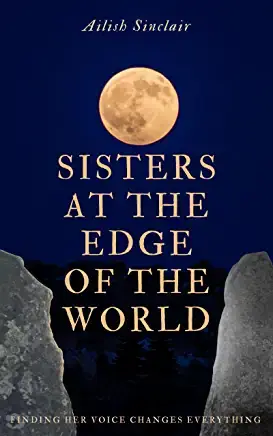It’s easy to be rude about genre fiction. People say that they don’t want books to be neatly classified. But genre fiction is easy to read. We know where we are. It’s easy to review. We can (mostly) recognise the core elements of a “good” book of historical fiction or a “good” romance. (Cute meet; obstacle to their love; obstacle overcome; HEA.) Above all (as far as writers are concerned), it’s easy (or at least easier) to sell. Perhaps that’s why Ailish Sinclair has, despite a track record of successful historical fiction, decided that Sisters at the Edge of the World should be self-published. And if ever there was an argument for the failure of the traditional publishing system, its apparent inability to accommodate books like Sisters at the Edge of the World is it.
Given her previous work, it more or less goes without saying that Sinclair’s prose is a pleasure to read. Even so, I did not find this an easy book to love: not at first, anyway. It’s not exactly a fantasy, though it’s set in a world where magic is a real and everyday part of life. It gives the impression of being historically accurate but, given that it covers a place and a period where the historical record is, at best, sketchy, it’s not quite what I would think of as a conventional historical novel. Is it a romance? Well, there’s a boy and a girl but, if they’d had Facebook in the Bronze Age, their relationship status would best be described as ‘complicated’.
As I kept reading I stopped worrying about what sort of story I was being presented with. I was just carried along with the life of Morragh, the girl who talks to the Mother-god and who is a spiritual leader of her people. The people came alive for me too: their daily lives, their sometimes complicated and uncomfortable relationships, and the ill-defined but all-pervasive spiritual beliefs that linked them and the world they lived in.
The coming of the Romans and the attack on their tribe by Agricola and his legions brings violence and death to their community – violence and death that might, just might, have been avoided if, at heart, the peace-loving worshippers of the Mother-god didn’t secretly like the idea of a good fight. And when that fight comes, Ailish Sinclair pulls no punches. It’s truly horrible, somehow even worse because Morragh (who has flashes of visions of the future) has already told us how it would be. Except it’s worse.
Life goes on after the battle, but I’m not saying anything about it because Spoilers. But the end, like the rest of the book, combines the supernatural and the mundane to open up wholly unpredictable situations. Does it end well? You’ll have to read it to find out.
If you, like me, are not at all certain that this is a book for you, keep going. Very soon you will join (judging from the reviews I’ve seen) the crowds of readers for whom this book is, in every sense, magical.


Trackbacks/Pingbacks